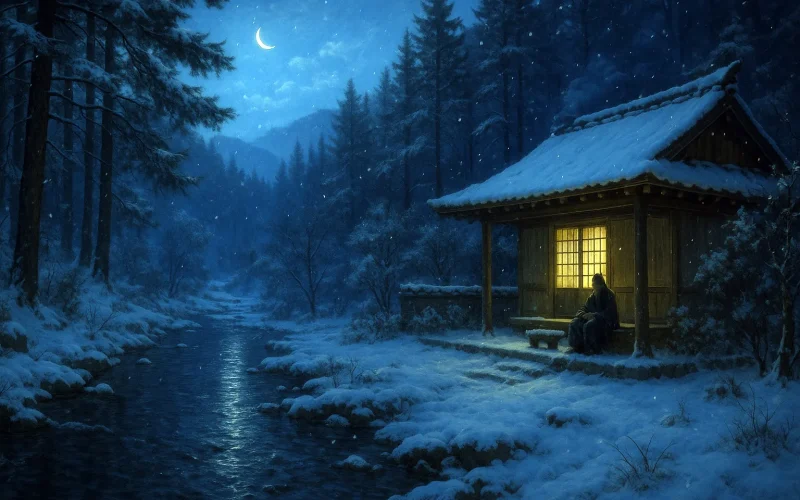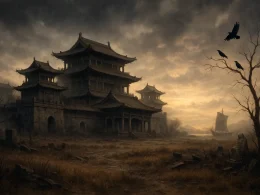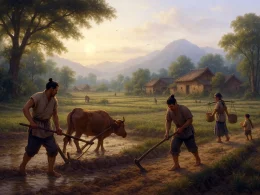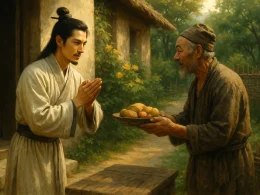Now that the sun has set beyond the western range,
Valley after valley is shadowy and dim….
And now through pine-trees come the moon and the chill of evening,
And my ears feel pure with the sound of wind and water
Nearly all the woodsmen have reached home,
Birds have settled on their perches in the quiet mist….
And still -- because you promised -- I am waiting for you, waiting,
Playing lute under a wayside vine.
Original Poem
「宿业师山房期丁大不至」
孟浩然
夕阳度西岭, 群壑倏已暝。
松月生夜凉, 风泉满清听。
樵人归欲尽, 烟鸟栖初定。
之子期宿来, 孤琴候萝径。
Interpretation
This poem captures Meng Haoran's experience waiting in vain for his friend Ding the Elder at Lumen Mountain, where the poet lived in reclusion. With serene natural imagery spanning dusk to nightfall, it reflects Meng's characteristically tranquil and refined aesthetic while subtly conveying the quiet melancholy of unmet expectations.
First Couplet: "夕阳度西岭,群壑倏已暝。"
Xīyáng dù xī lǐng, qún hè shū yǐ míng.
The setting sun crosses western peaks; Valleys plunge into sudden darkness.
The opening verbs ("crosses," "plunge") dramatize twilight's swift transformation, establishing temporal awareness that underlies the waiting theme.
Second Couplet: "松月生夜凉,风泉满清听。"
Sōng yuè shēng yè liáng, fēng quán mǎn qīng tīng.
Pine-filtered moonlight chills the night; Wind-blown springs fill clear ears.
Sensory richness emerges through tactile coolness and auditory purity, crafting an immersive nocturnal atmosphere where nature becomes companion.
Third Couplet: "樵人归欲尽,烟鸟栖初定。"
Qiáo rén guī yù jìn, yān niǎo qī chū dìng.
Woodcutters nearly all returned; Mist-veiled birds settle to roost.
Human and avian routines emphasize gathering darkness and deepening solitude, subtly marking the friend's absence.
Fourth Couplet: "之子期宿来,孤琴候萝径。"
Zhī zǐ qī sù lái, gū qín hòu luó jìng.
You promised overnight visit - My lone lute waits on vine-wound paths.
The concluding image of the unattended lute embodies patient expectation without resentment, elevating disappointment into aesthetic contemplation.
Holistic Appreciation
The poem orchestrates a symphony of natural transitions - solar descent, lunar ascent, human departure, avian settlement - against which the poet's steadfast waiting becomes a meditative practice. Rather than expressing frustration, Meng transforms the unmet rendezvous into an occasion for deeper communion with mountain darkness and luminous solitude. The unplayed lute symbolizes both absence and presence, its silent strings vibrating with unfulfilled yet undiminished friendship.
Artistic Merits
- Temporal architecture: Structures the poem as a day's natural liturgy
- Sensory democracy: Balances visual, auditory and tactile perceptions
- Symbolic restraint: The lute suggests more than it states
- Emotional alchemy: Transforms disappointment into artistic opportunity
Insights
This mountain vigil teaches the wisdom of creative patience. Meng demonstrates how unmet expectations can become portals to deeper attention - his friend's absence opens space for heightened awareness of pine moonlight and wind-carried water sounds. The poem suggests that true companionship exists beyond physical presence, and that artistic practice (symbolized by the lute) can sustain connection across absence. In our age of instant gratification, it reminds us that some of life's richest moments emerge when plans go awry, if we possess the stillness to receive them.
Poem translator
Kiang Kanghu












